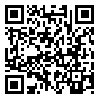BibTeX | RIS | EndNote | Medlars | ProCite | Reference Manager | RefWorks
Send citation to:
URL: http://rehabilitationj.uswr.ac.ir/article-1-1135-en.html
2- University of Social Welfare & Rehabilitation Sciences, Tehran, Iran ,
Objective: Following diagnosed as hearing impaired many children are referred for auditory training as a part of rehabilitation program. The aim of the study was to explore the issueof discharging of hearing impaired children from auditory training program.
Materials & Methods: This qualitative study was carried out in Tehran city using semi-structured deep interviews with experienced audiologists. A combination of purposive and snowball sampling techniques were used to reach audiologists experienced in auditory training. Interviews were continued to the point of data saturation, which occurred after interviewing the 8th interviewee. Transcripts based on interviewer’s notes of important points during the interviews and audiotapes were analyzed. Meanings were generated during a code-and-retrieve process and codes grouped together under larger themes and clusters.
Results: Some interviewee did not perceive ‘listening abilities development’ and ‘receiving auditory training services’ as different entities. It seems that willingness of family and their limitations’ were the only well determined and agreed-upon criteria for ending the auditory training sessions. Results cleared that most participants did not believe that auditory training programs should necessarily come to an end. However participants who believe in necessity of defining a point for termination of training sessions, referred to current assessment tools for children’s auditory skills as inefficient for use in discharge decision making.
Conclusion: Non agreement of audiologists on the necessity of planned discharge from the auditory training and inefficiency of auditory skills assessment tools, could be challenging dilemma in national neonatal hearing screening program in terms of rehabilitation management.
Received: 10/07/2012 | Accepted: 3/07/2013 | Published: 3/07/2013
| Rights and permissions | |
 |
This work is licensed under a Creative Commons Attribution-NonCommercial 4.0 International License. |





